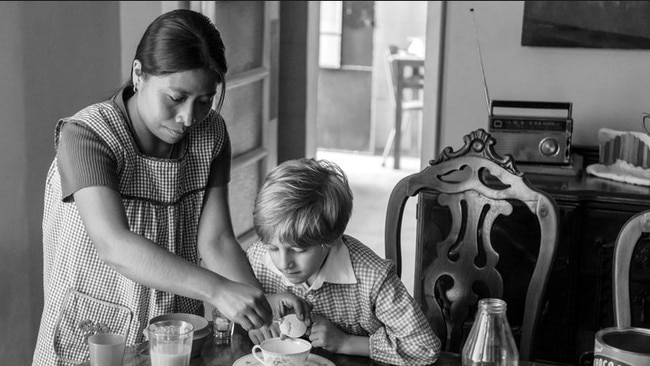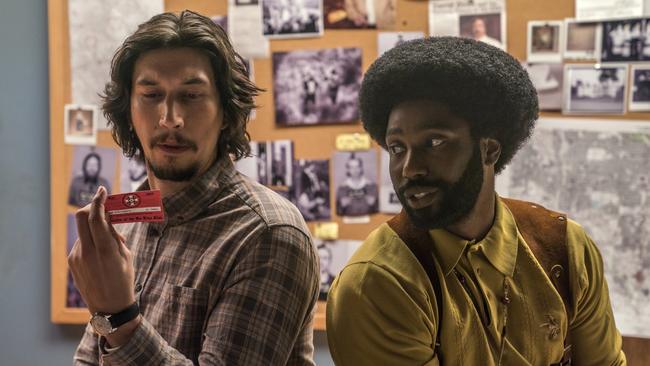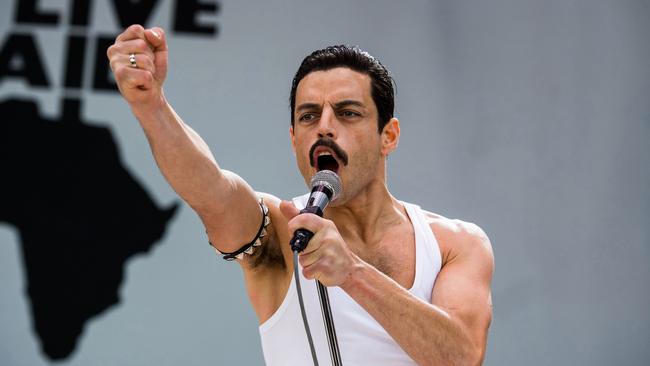Oscars predictions: Roma a reel contender
The thought of Lady Gaga winning the Oscar for best actress tomorrow is scandalous, especially against this masterpiece.

What a strange cavalcade of expectations the Oscars are. We take to the Academy Awards with a heightened sense of bread and circuses while at the same time knowing that all kinds of talents and artistic glories will be on show. We know that some of the greatest films ever made, from Citizen Kane down, have failed to win the Oscars they should have and some of the starriest and most historic performances (Peter O’Toole as Lawrence of Arabia, say) did not win the best actor award. Yet many of us troop along at this time of year in the big lead-up to the Oscars, keen to know what garlic and sapphires, as TS Eliot put it, there may be amid the mud. Or rather what spice and precious things there may be among the general entertainment that there’s a push and a glow behind.
And one of the mighty and marvellous things about this year’s Oscar nominations is that with all the glitter and the hype, all the worthy political intentions and the concerted artiness and populism, there’s one towering film — Alfonso Cuaron’s Roma — which happens to be a masterpiece. It’s made by Netflix (which is a sign of the times) but the fact that a foreign-language film could actually make it to nominations in these categories shows that every so often the Academy forgets its game of fame and promotion and simply wants to honour a great work of art.
Though there are signs of artistic catch-up in this year’s nominations. Was that superb actor Willem Dafoe — who was born to play Van Gogh in At Eternity’s Gate, directed by painter Julian Schnabel — nominated because he has never won an Oscar? And what about Glenn Close in The Wife? Is the fact that we think of Close in the same breath as Meryl Streep what makes us forget that Streep has won three Oscars and Close none despite seven nominations? The Wife is all about a writer (Jonathan Pryce) who wins the Nobel Prize in Literature even though his wife actually writes the books. It’s a middlebrow “serious” film grounded in improbability, though that doesn’t stop Close from giving a flawless performance, steely and stricken by turns.
Needless to say, some people want the Oscars to spurn the highbrowism of At Eternity’s Gate and the Broadwayish steadiness of The Wife and simply open themselves up to the pure bubblegum pursuit of pleasure represented by the great franchises. Hence the nomination of Black Panther. No doubt it helps that this is a black superhero film, but nominating a pure bit of sensational action and thrills is an attempt to stop the Oscars just disappearing up themselves in pursuit of high art that has nothing to do with audiences.
So how on earth are we supposed to negotiate the awards that people take notice of? Do we want to see Christian Bale win best actor for Vice, the devastatingly negative portrait of George W. Bush’s vice-president Dick Cheney? There’s no denying it’s a very formidable impersonation. Bale captures everything about him but his ordinariness, the kind of reasonableness projected by the man who dominated the first half of the second Bush’s presidency. It’s a very entertaining bit of liberal villainising and Sam Rockwell (who’s been nominated for best supporting actor) is a better George W. Bush than you would believe possible. But the very dashing cleverness of Adam McKay’s Vice — which is also up for best director and best picture awards — while springing with talent and a very charming, not quite predictable whimsy, is not quite history and not quite drama.

Is that also true of Spike Lee’s BlacKkKlansman, with its bizarre, captivating true story of an African-American detective (John David Washington, Denzel’s son) penetrating the Ku Klux Klan? This is a compelling and kinky story and it includes very powerful vignettes of Stokely Carmichael (Corey Hawkins), a Black Panther that is, a real Black Panther and one of the world’s great orators) and David Duke (Topher Grace), the grand wizard of this white supremacist horror show. It does get a bit hard to credit how the KKK managed to accept Adam Driver (from Girls and the recent Star Wars) — who is up for best supporting actor and who has a very distinctive deep voice — as a substitute for the black hero.
There is no moment of comparable ambivalent malignancy in the other big-time African-American film, nominated for best picture, Green Book, which is the one about the white guy from the Bronx — a stout, rough-voiced Viggo Mortensen — driving a highly cultivated black concert pianist played by Mahershala Ali further and further down the deep south. As everyone has said, this is a reverse Driving Miss Daisy and although it’s a big appeal film, it’s not as well made as Bruce Beresford’s film with Jessica Tandy and Morgan Freeman, which may be one reason why it’s not nominated for best director.
Still, the central performances are superb. This is one of those films (like Brokeback Mountain with Heath Ledger and Jake Gyllenhaal) where the leads have had to be broken in two, nominations-wise, so they don’t destroy each other’s chances.
Ali as the refined pianist at home with neither fried chicken/Little Richard black culture nor the unearned superiority of white establishment culture (though at a crucial moment he calls on the aid of Bobby Kennedy) is utterly convincing in his sophistication, his finnickiness and his abiding pain and rage. This is a very fine performance of some historical significance: this self-protective, fastidious gay black man. Then there’s Mortensen as the driver. This is a magnificent performance tinged with all sorts of subtleties, a portrait of a rough and tough Italian-American, a bouncer from the Copacabana who comes to understand something about the mysteries of human personality and the veils of race.
But Green Book is an expensive, upper-level mush film.
So, with bells on, is A Star is Born, though Bradley Cooper directs it expertly and efficiently and plays the drunken drug-addled male lead with subtlety while providing strong support to Lady Gaga. Does every generation have to remake A Star is Born as a kind of tragicomic Pygmalion exploiting the talents of the big-time singer/performance artist of the moment, to the disdain of the previous generation?
The most celebrated version is the 1954 one with James Mason as the male lead and Judy Garland in the greatest role of her adult career, though Barbra Streisand and Kris Kristofferson also had a go in 1976. The Lady Gaga A Star is Born is a perfectly respectable piece of filmmaking (without looking remotely like best picture) which will have its charms if you thrill to Lady Gaga. The thought of her winning best actress against this year’s competition would be a bit of a scandal.
That’s not true of the male lead in the other rock extravaganza, Bohemian Rhapsody. Rami Malek’s performance as Freddie Mercury in this rather ordinary dramatisation of the Queen saga is dazzling and it has the wild excitement of a great performance at the outset of a career. Malek inhabits the persona of Mercury with a captivating histrionic brio and Bohemian Rhapsody is a film that rides pretty absolutely on its performances, of which Malek’s is the crown.
The film is attributed to Graham King (and was in fact largely directed by Bryan Singer, who is embroiled in sexual scandal). It has the peculiar quality of being much better directed and performed than it is scripted.
Nothing could be more different from the rough band-driven strong starry debut-capped populism of Bohemian Rhapsody than Can You Ever Forgive Me?, though they are both (like so many of the films in the 2019 Academy Awards) about real-life people.
This is the one about Lee Israel, the woman who successfully and brilliantly faked and forged letters from such literary greats as Noel Coward and Dorothy Parker.
Can You Ever Forgive Me? represents a different world from any of the other nominees. It’s a small film about a woman who is very talented and perilously hard up and who has no comfort in the world except her cat and an untrustworthy male gay friend of blinding charm. Melissa McCarthy plays the woman, channelling the tremendous melancholy power of a great comedienne in alternate mode.
It is a performance to die for and so is Richard E. Grant’s as the old sick gay lightweight. The cinema rarely gets, and seldom deserves, performances as crisp and funny and heartbreaking as these.

Both the actress awards are liable to be thrown into confusion by The Favourite, the weird (some would say wonderful) film about Queen Anne. It comes with a script co-written by Australia’s Tony McNamara which has been nominated for an Oscar. The Favourite is like nothing on earth.
This is the court of the last of the Stuarts and Olivia Colman’s Queen Anne is a feckless rabbit-loving woman who indulges every whim, smiles and sweats and suffers, and is served by Rachel Weisz as Sarah, Duchess of Malborough and by Emma Stone as a young woman who has fallen from the aristocracy to being a mere servant but who contrives for herself a marriage.
Colman is up for best actress and the other two are vying for best supporting actress. Each of them is very good indeed. The Favourite has the enormous advantage of being utterly original and compelling. Yorgos Lanthimos has created an imaginatively coherent (supremely crazy) world and in its weird dazzling way this film deserves its place in the best picture/best director categories like no film except Roma.
But Roma is in a category all of its own. Cuaron — who shot the film himself, in colour, and then bled it back to an extraordinarily beautiful, silver-edged black-and-white — has taken the period of his own childhood (the setting is 1970-71) to present with an extraordinary panoramic credibility and compassion the story of a Mexican Indian servant girl and her life looking after an upper-middle-class family.
We see Yalitza Aparicio as Cleo in all her hesitation and warmth and desolation. We see her taking on a family she comes to adore, we see her with a man who does not know her worth, we see her in childbirth, we see her in the vicinity of the threat of the waves of the sea.
It is the grandest, the most moving and humanly true performance in a film that creates a wholly believable world from the reconstructed memory of one.
Everything about Roma creates a sense of awe and humbles the spectator, who is liable to wonder how long it’s been since the cinema has achieved anything like this. Both Aparicio and Marina de Tavira as Sofia, the family matriarch — up for best supporting actress — deserve to win Oscars.
It does leave the other nominations for Academy Awards for dead and it would be a bit ludicrous if it didn’t sweep the field.


